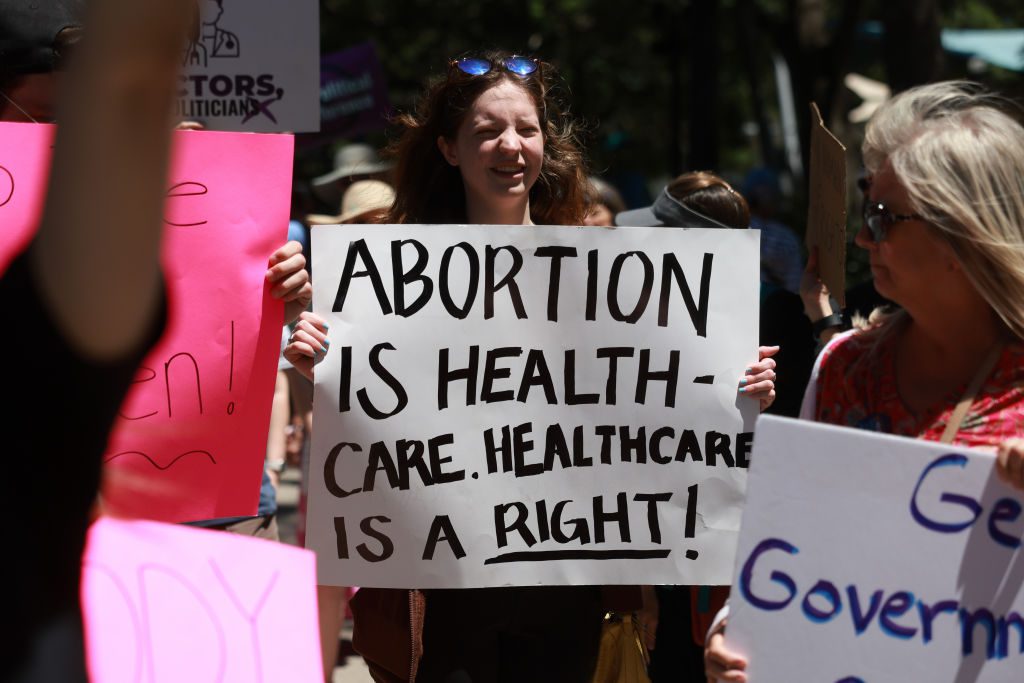
Photo by Joe Raedle/Getty Images
A Florida mother had to carry her pregnancy to term at great risk to her physical and emotional health, even though doctors told her the baby would live only a few hours.
In 2022, when she was around 24 weeks into her pregnancy, Deborah Dorbert, a Florida wife and mom, learned during a routine ultrasound that the baby that she and her husband were so eagerly awaiting had a rare medical disorder.
Called Potter syndrome, the fetal disorder is caused by decreased amniotic fluid surrounding the baby in the uterus, according to the National Institutes of Health.
The news was devastating to the family, including the couple’s four-year-old, a boy who was looking forward to having a little brother. But as painful as the news was, it was nothing compared to what came next, as Dorbert shared with ABC’s Good Morning America.
After being told by doctors that the baby would not survive and that the pregnancy was high-risk for her, the couple agreed to induce the pregnancy early instead of carrying it to term.
But a 15-week abortion ban signed into law by Gov. Ron DeSantis that same year banned nearly all abortions after 15 weeks in Florida. The 15-week ban, however, allowed for exceptions if the fetus had a fatal abnormality or in cases when the mother is at risk. Still, citing state law, the hospital affiliated with Dorbert’s maternal-fetal medicine specialist would not induce birth early.
With no financial resources to travel out of state for the procedure, at 27 weeks into her pregnancy, Dorbert had no choice but to carry it to term.
RELATED: Watch This Video to Understand the Devastation Abortion Bans Cause
In March of 2023, after months of suffering with intense emotional and physical pain and discomfort, Dorbert delivered a baby that, as doctors had predicted, only lived a few hours.
“Delivering him just to watch him die was just all extra added trauma,” Dorbert said on Good Morning America.
@floricuas The Florida Supreme Court on Monday issued a ruling upholding Gov. Ron DeSantis’ 15-week abortion ban that will allow a six-week ban to take effect in 30 days. In response, House Democrats held a “field hearing” in Broward County to meet with Florida women who have been impacted by the state’s restrictive abortion laws. In the meeting, which was co-sponsored by Florida Democratic state Rep. Debbie Wasserman Schultz, a young mother recounted the ordeal she and her family lived through when she was denied an abortion after doctors found out her baby had not developed kidneys and was not viable. 🖊️: @gcbalido 📸: N/A
This sent her into a spiral of sadness and depression made tougher by having to parent a then 4-year-old, and explain his brother’s death to him, while navigating the intense grief that culminated in suicidal thoughts.
Dorbert was not alone in her grief. Research shows that a lack of access to abortion care may be linked to an increased risk of psychological stress, according to the American Psychological Association.
After going through therapy to help with the depression and suicidal thoughts, and motivated by a desire to help change Florida’s laws so that other women and families don’t have to endure a similar ordeal, Dorbert is now speaking out about the real physical, emotional, and psychological impact of extreme abortion bans.
RELATED: Video: A Six Week Abortion Ban Is a Total Ban
This May, a new abortion ban went into effect in Florida that bans virtually all abortions after six weeks of pregnancy. The ban allows for exceptions if the fetus has a fatal abnormality or in cases when the mother is at risk, but some physicians are concerned about how to interpret the laws, which carries severe penalties for doctors, such as fines and loss of medical license, among others.
“The Legislature uses wording that is very confusing,” Dr. Cecilia Grande, an Obstetrics & Gynecology specialist in Miami told Floricua.
“They say, ‘Well, if the patient’s life is at risk, you can go ahead and you can induce the delivery.’ But what is ‘at risk’?” she asked.
The situation, Dr. Grande says, puts doctors and patients in a situation that is “very, very difficult.”
“Now, we’re told to send the patient home and wait for the patient to be sick. Do we wait for them to be very sick, or just slightly sick? But then, if the patient gets sick, we get sued. Plus, that is malpractice. So, it’s a very, very difficult situation and the best way I can put it is a human tragedy.”
Voters could restore abortion rights in Florida
In November, Florida voters will have the chance to vote on Amendment 4, a citizen ballot initiative that would enshrine abortion rights in the state constitution. The amendment would protect abortion rights up to viability, which is generally understood to mean when a baby can survive outside the womb, which the medical community puts at about 24 weeks.
Reproductive rights advocates like Dr. Grande, Floridians Protecting Freedom, and state legislators like Anna Eskamani and Lauren Book, are working to make sure the amendment passes.
“I don’t tell my patients how to vote, but I ask all of them ‘Are you registered to vote?’,” says Grande. “Because if we don’t vote, we can’t be part of this conversation.”
Are you ready to vote? Make sure to check your voter registration status, see who’s on your ballot, and make a voting plan here.
Support Our Cause
Thank you for taking the time to read our work. Before you go, we hope you'll consider supporting our values-driven journalism, which has always strived to make clear what's really at stake for Floridians and our future.
Since day one, our goal here at Floricua has always been to empower people across the state with fact-based news and information. We believe that when people are armed with knowledge about what's happening in their local, state, and federal governments—including who is working on their behalf and who is actively trying to block efforts aimed at improving the daily lives of Florida families—they will be inspired to become civically engaged.


Harris says nation must accept election results while urging supporters to keep fighting
Harris delivered her remarks at Howard University, her alma mater and one of the country's most prominent historically Black schools, in the same...

What happens next? A timeline of the process between voting and inauguration
Here's what happens next, from the moment the last vote was cast to Inauguration Day on Jan. 20, 2025—no conspiracy theories, no unfounded claims,...

5 places in Florida to donate clothes, shoes, and more
Decluttering your home can provide such a satisfying feeling of accomplishment. After sorting through all of your belongings and determining what...

8 Orlando hotels that pack as much fun as the theme parks
With waterslides, family arcades, playgrounds for the kids, and spas for mom and dad, these Orlando hotels will make your vacation unforgettable!...




